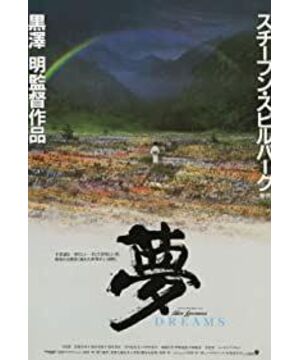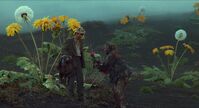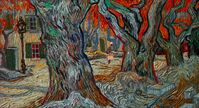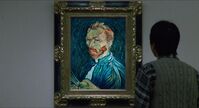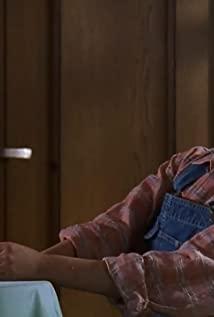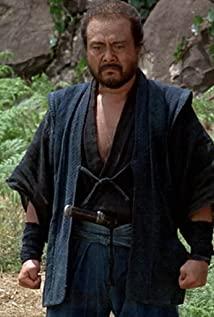's mood when writing this article is really complicated, because I actually saw so many articles criticizing and even defaming "Dream" on the Internet. What "Kurosawa is really not the kind of director who can shoot dreams", what "It's like a very delicate girl who puts on a heavy disgusting makeup because of marriage", what "Kurosawa is already exhausted." …To
put it bluntly, most people who say such things are really brazen. These words may be serious, but they are by no means excessive. What is a dream? Who is the director who can shoot dreams? Who dares to say that his dreams are as unthinkable as "Mu Holland Road"? Who dares to say that his dreams will look like Dali's paintings? Is it true that dreams must be filmed as "An Andalusian Dog" so that they cannot be explained before they are called dreams? Don't be clever and think it's different. Do you think that you criticize the master and compare it to the master? It was nothing but pretentious emptiness, but the contentment of a mosquito after biting a lion, sad and contemptible. This is just like the criticism of Lu Xun by Gao Changhong in the 1920s and 1930s. It is not that Lu Xun wrote badly, but that Lu Xun is easy to attract attention... In the
final analysis, "dream" is really a very personal thing, a certain meaning. In other words, everyone’s dreams have their own different modes, and everyone also has the posture that dreams should have in their own imagination. I personally like Chagall's paintings, so pure and harmonious. If possible, I hope my dream will be like that. But after all, it is impossible. To tell the truth, my dreams are really mediocre, and sometimes even ashamed: "How can I have such a boring dream?" That's it. The friends I have been with, (except for one friend, she often has some incredible dreams, and she can remember them every time, telling me every bit, and of course they are not great dreams) mostly with me The same daily dreams are as mediocre as everyday. That being the case, from an emotional point of view, what kind of dream Kurosawa wants to have, isn't it?
In fact, Akira Kurosawa clearly told us at the beginning of the film: "Have a dream like this...". Obviously he was telling everything slowly in a first-person storytelling posture. This first dream is about legends, which is actually Kurosawa's reflection on folk customs and traditions. The sky suddenly started to rain and the foxes were having a secret wedding in the wooded forest. Kurosawa used a very large pen and ink to describe in detail how the fox's wedding team proceeded carefully, but it was still seen by the ignorant boy. It's weird to put the seriousness of the foxes together with their cautious actions. I thought it was Akira Kurosawa's satire on the red tape of traditional Japanese culture. However, what is even more weird is that the scared teenager who ran home was turned away by his mother because he saw the fox's wedding and violated a taboo. He had to apologize to the fox and even prepare to dictate himself! This kind of thing is hard to believe at first glance, but it is actually happening in Japan. Not only do adult samurai have abdomen cut after making a mistake, but also minor children are required to have abdomen cut to apologize. I have read the stories of the three brothers Sakon, Neiji, and Bamo. Sakon and Neiji were arrested for attempting to assassinate Ieyasu. Ieyasu appreciated their courage and gave them all men in the family, including Bamo, who was only eight years old at the time. The two older brothers were afraid that his younger brother was too young to complete the abdomen, and wanted him to do it first. But Bimo had never seen an abdomen, so they showed it to him. After seeing the brothers cut their abdomen, Xiaohachimo did not show any fear, and completed the abdomen neatly. This story has been passed down in Japan. Many Japanese writers and directors have thought deeply about suicide, such as Yukio Mishima and Masaki Kobayashi. Kurosawa, who had attempted suicide at 21 places in the Seiya Mansion, was obviously also one of the Japanese who had a keen interest in suicide. The image tells us that when the child came to the fox’s hometown with a dagger, the mountain flowers were in full bloom, and the rainbow was like an arch...what does this mean? Why would a child who committed suicide see such a heavenly beauty? Kurosawa didn't give us too many hints.
I guess that beauty is the landscape after death!
"Dead, go to sleep...
There may be dreams in the deep sleep of death.
Ah, this is an obstacle:
when we get rid of the dying skin, what
dream will come in the long sleep of death?"
This is "Life and Death" by Shakespeare. The translation is stiff and far from the original poem, but I believe Kurosawa, who is familiar with Shakespeare, will never be unfamiliar with it.
The second dream is about peach blossoms, but it still involves Japanese folklore. March 3 is the Hinamatsuri Festival in Japan. Because it is the season when peach blossoms are in full bloom, it is also called "Peach Blossom Festival." On this day, most girls will pick peach blossoms to celebrate, and they will also receive dolls as gifts. The dolls were placed on the altar for about a month before they were carefully put away, and they would be brought out and decorated again in the next year. Therefore, all the clan of the princes and daimyo, the puppets have a history of hundreds of years. There are not only the emperor and the queen mother, but also female officials below the second level, five young boys who play music, attendants, and errands, as well as furniture and daily necessities. Peach blossoms and Hina dolls are also the protagonists of this second dream. The girl the boy saw was the only fairy in the peach blossom forest that hadn't been cut down. The reason why she was not cut down was because she was too young to be cut down for decoration. It is also Hinamatsuri, where human girls enjoy various blessings, but Taoshu’s daughter has to endure the pain of bereavement. Taoshu's daughter envied human girls, but she also accused humans of crimes. He led the boy to Taolin to listen to the complaints of the Taoshu family. As an old man in his eighties, Kurosawa's imagination is quite rich. He combined Hina dolls and Noh, and imagined Tao Lin as a young altar, creating a scene with a Japanese taste and showing his nostalgia and yearning for Japanese traditional culture. The image of the boy should be a prophet. Only he saw Peach Tree's daughter. He wanted to tell others, but the people around him turned a blind eye. He was in pain, because he wanted to preserve the full bloom of spring, but he could not stop people from cutting down the peach forest; he dreamed that the peach blossoms were in full bloom, and opened his eyes, but he saw broken arms and branches... This is the distress of the prophet, and also human beings. The sin of all! So the boy cried, and Kurosawa cried. The old man hopes that young people can represent the new generation of mankind, no longer ignore nature, cherish them, and prevent the beautiful nature from disappearing around...
In the third dream, Jian Feng turned sharply, changing the bright and colorful in front, and the picture became gloomy and cold. With heavy breathing, the close-up shots are gradually pulled to the middle shots, and the oppressive feeling of the storm passes through the screen, suffocating. The extreme cold and this sense of suffocation broke the psychological bottom line of the climbers. Everyone began to doubt, quarrel, and criticize... The leader was the only person who still remained sober. He tried to eliminate everyone’s doubts and encouraged everyone to move on. He knew that Take a break in the blizzard, and you will rest forever. But the persistent spirit of hard maintenance can't relieve the fatigue and cold of the body. The players fell one by one, and the leader finally loosened the rope in his hand. At this point, the theme of the dream has been revealed undoubtedly, this is a dream about will. Akira Kurosawa said: "I like this kind of weather. It's either a scorching sun or a midsummer, or a bitter winter and a severe cold. It's either a downpour or a combination of wind and snow." He is a masculine director. Down. A white-clothed woman came in the misty consciousness, gently soothing her tired skin, the voice of "snow is warm and ice is hot" repeated in her ears, and the leader was almost unconscious. "Contempt for death is a brave act, but when life is more terrifying than death, it is truly brave to live!" He finally pushed aside the gentle death and regained life from the dead. Humans are actually very fragile animals. Our body is far weaker than other animal raptors, but we have the will. I suddenly remembered "The Snow of Kilimanjaro." Kilimanjaro is the highest mountain in Africa. There is a temple built for God on the mountain, and beside the temple, there is a leopard that has been frozen and dried. Hemingway said: "No one has explained what leopards are looking for in such a cold place." In fact, no leopard will really freeze to death on the mountain, because they will not come to a place where there is no food and cannot survive. It is here, and only people can conquer these peaks. They will eventually leave behind some frozen and dried monuments, taking away the different scenery and the joy of conquering...
When I saw the fourth dream, a line of Pushkin’s poem flashed through my mind, and the name of the poem was also called "Dream "—— "Dream is not joy for him, but pain. Mengshen did not sprinkle poppies on his tired eyelids with heavy fingers"
...
(The article was not written continuously, and the feelings at that time have now faded. I thought. The idea of posting it after writing it, I’m afraid it won’t come true, I’m sorry... I’ll leave the fragments here for now, so that I don’t even forget the article itself. This is the so-called "keep it here.")
2006.8
View more about Dreams reviews


